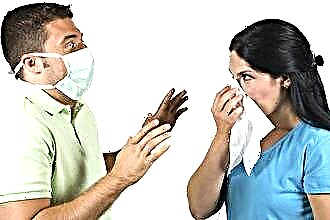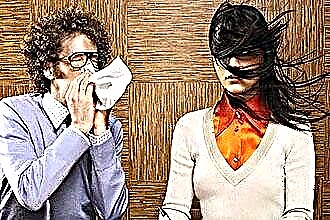 Treatment of acute rhinitis in adults is carried out mainly with antiviral drugs, as well as nasal anti-inflammatory and vasoconstrictor drugs. The principles and methods of treatment of rhinitis largely depend on the causes and stage of development of inflammation in the nasopharynx. The neglected forms of ENT diseases are not always possible to eliminate with the help of pharmacy funds.
Treatment of acute rhinitis in adults is carried out mainly with antiviral drugs, as well as nasal anti-inflammatory and vasoconstrictor drugs. The principles and methods of treatment of rhinitis largely depend on the causes and stage of development of inflammation in the nasopharynx. The neglected forms of ENT diseases are not always possible to eliminate with the help of pharmacy funds.
The course passage of physiotherapeutic procedures within the walls of polyclinics helps to quickly stop inflammation, restore the integrity of the nasal mucosa and normalize the mucociliary clearance.
How to be treated correctly?
Rhinorrhea is a protective reaction of the body caused by irritation of the nasal mucosa by infectious or allergic agents. The abundant production of mucus helps to cleanse the inner surface of the nasal cavity from pathogens - viruses, microbes, fungal spores, etc. For this reason, ENT doctors do not recommend the use of vasoconstrictor drops at the initial stages of the development of the common cold.
Many are trying to get rid of rhinorrhea and congestion on their own, despite the fact that not everyone knows how to treat rhinitis correctly. The method of treatment largely depends on the causes of the development of the disease, i.e. the causative agent of the infection. Colds triggered by hypothermia are treated with antiviral agents, bacterial - with antibiotics, and allergic - with antihistamines.
The sequence of using certain pharmaceutical drugs also depends on the stage of development of ENT disease:
- Stage 1 - characterized by periodic narrowing and dilation of blood vessels and edema of the turbinates; it is recommended to stop pathological processes in the mucous membrane with decongestants;
- Stage 2 - accompanied by abundant exudate from the nasal canals; a runny nose is treated with lavages, inhalations, as well as drops of a vasoconstrictor effect;
- Stage 3 - the attachment of the bacterial flora to a viral infection leads to a deterioration in the patient's well-being and the subsequent release of not transparent, but yellowish exudate from the nasal cavity; to treat acute rhinitis complicated by a bacterial infection, you need antimicrobial tablets and nasal drops.
With the development of bacterial rhinitis, it will be possible to stop the unpleasant manifestations of the disease within at least 10 days after undergoing intensive antimicrobial therapy.
Treatment at home
In the treatment of rhinitis, an important role is played by a special therapeutic regimen, the observance of which accelerates the healing process. To quickly cure a respiratory disease, adhere to the recommendations of the ENT doctor from the moment the first signs of inflammation of the nasopharynx appear - nasal congestion, nasal voice, swelling of the turbinates, lacrimation, etc.
The main measures of the special therapeutic regimen include:
- adherence to bed rest;
- refusal to visit work within 5-7 days;
- regular ventilation of the room;
- maintaining high humidity in the room (more than 60%);
- refusal to eat fatty and too hot foods;
- consumption of more than 1.5 liters of warm drink per day.
For the entire period of treatment, it is necessary to stop drinking alcohol, which creates an additional burden on the liver and reduces the effectiveness of pharmaceutical preparations.
Compliance with the drinking regime is one of the most effective "catalysts" for the healing process. Why? Together with the liquid, toxic substances are removed from the body, as a result of which the severity of signs of intoxication decreases.
Features of pharmacotherapy
Treatment of acute rhinitis should be aimed at eliminating inflammatory reactions in the nasal cavity and rhinorrhea. To facilitate the course of the disease and speed up recovery, it is recommended to use the following pharmacotherapy agents:
- antiviral;
- decongestants;
- immunostimulating;
- antipyretic;
- vasoconstrictor;
- mucolytic;
- antibacterial;
- antiallergic.
 With the passage of complex therapy, it is possible to eliminate the main manifestations of the disease within 2-3 days. If nothing is done and no medication is used at all to fight the common cold, complications can develop.
With the passage of complex therapy, it is possible to eliminate the main manifestations of the disease within 2-3 days. If nothing is done and no medication is used at all to fight the common cold, complications can develop.
Edema and inflammation of the turbinates and sinuses are fraught with the development of frontal sinusitis, ethmoiditis, sinusitis, otitis media, etc.
Physiotherapy procedures that can be performed at home are no less effective. Saline solutions for rinsing the nose and mineral water for aerosol inhalations are the best means by which you can eliminate inflammation in the nose and, accordingly, all manifestations of acute rhinitis.
Overview of pharmacy products
It should be noted that the treatment of acute rhinitis with pharmacy drugs must be agreed with the attending physician. Irrational intake of several types of drugs at once often entails complications and the development of side diseases. In particular, the abuse of vasoconstrictor drugs is fraught with the appearance of drug-induced rhinorrhea, and antibiotics - candidiasis.
Depending on the causes of the common cold, the following drugs may be included in the standard treatment regimen:
| Pharmacy products | Name | Therapeutic action |
|---|---|---|
| antivirus |
| destroy viruses and stop inflammation |
| antibacterial |
| inhibit the reproduction of microbes and accelerate the recovery of mucous membranes |
| hormonal (corticosteroids) |
| prevent the synthesis of inflammatory mediators, relieve puffiness and eliminate lesions |
| vasoconstrictor |
| reduce swelling and make breathing easier through the nose |
| decongestants |
| relieve swelling and improve the patency of the nasal passages |
| immunostimulating |
| increase resistance to infectious agents and stimulate the production of interferon |
Premature discontinuation of pharmacotherapy in some cases leads to recurrence of inflammation and the transition of the disease into a chronic form.
To prevent complications, the drugs must be taken in the dosage recommended by the doctor. Even in the case of a significant improvement in well-being, it is impossible to refuse taking medications earlier than the due date. This can provoke the multiplication of pathogenic agents and complications.
Treatment in the clinic
It is recommended to treat moderate and severe forms of acute rhinitis on an outpatient basis. Physiotherapy under the supervision of a specialist allows, if necessary, to adjust the therapy regimen, which makes it possible to shorten the recovery period. Some of the most effective physiotherapy procedures that are carried out within the walls of clinics include:
- laser therapy - irradiation of the nasal cavity with light beams in the infrared wavelength range; positively affects the state of the mucous membrane, accelerates the resorption of infiltrates and relieves swelling;
- UHF therapy - exposure of the upper respiratory tract to high-frequency electromagnetic fields; carried out with the help of the apparatus "Miniterm" or "Undatherm", the use of which prevents the spread of inflammation and severe tissue edema;
- UV-therapy - treatment of the affected areas of the mucous membrane with ultraviolet radiation, which has a pronounced anti-inflammatory and antimicrobial effect.
To achieve the desired therapeutic results, hardware treatment is carried out in courses of 10-15 sessions. Depending on the severity of the disease, the main signs of nasopharyngeal inflammation and rhinitis are eliminated within a week.
Adjunctive therapy
Acute rhinitis can be cured through the available physiotherapy procedures. As practice shows, sanitation of the nasal cavity with saline solutions and inhalation with a nebulizer help to cope with moderate rhinitis. However, they are recommended to be used in combination with pharmaceutical preparations. Complex treatment provides a rapid regression of inflammation in the nasopharynx and rhinorrhea.
To clear mucus from the sinuses and canals, you can use ready-made isotonic preparations (Physiomer, Marimer, Aquamaris) or saline solutions prepared at home. To do this, you need to dissolve 1 tsp. table salt in 1 liter of boiled warm water. It is advisable to wash it 4-5 times daily for several days.
Aerosol inhalation is no less effective. Ultrasonic and compressor inhalers convert liquids into an aerosol, which is almost instantly absorbed into the mucous membranes and acts directly on the foci of inflammation. ENT doctors recommend using Tonsilgon N, Miramistin, Lazolvan and Rotokan as drugs.



